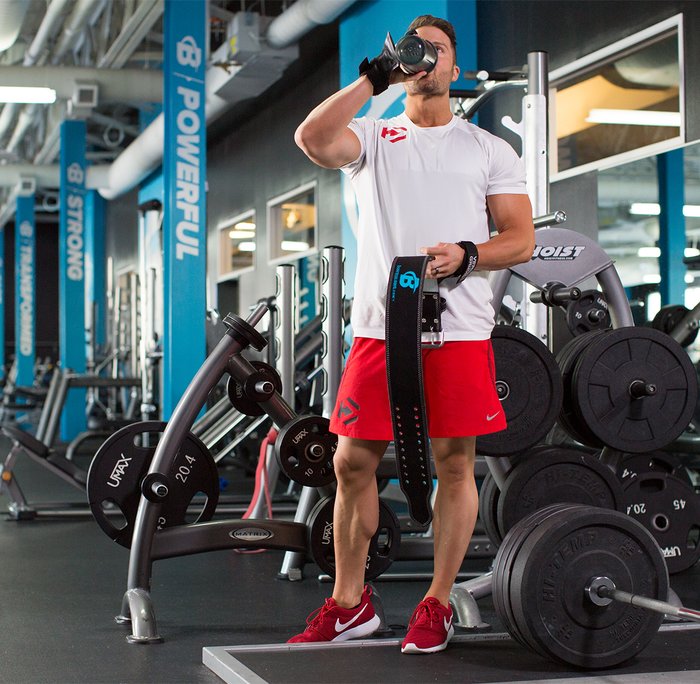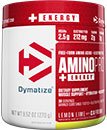Ready to supercharge your gym results? Getting a sweet physique takes more than just knowing which exercises to do and how to do them. Whether you want to build muscle, burn fat, or simply improve your performance, these eight tips can help you get there, inside and outside the gym.
Give one, two, or all of them a try and prepare to see your results skyrocket.
1. Get Yourself in the Zone
Before each workout, mentally prepare yourself for the exercises to come.
"I like to do positive self-talk and visualization," says Dymatize athlete and lifestyle coach Brooke Erickson. "I'll visualize myself doing an activity before I begin it. If I'm getting ready to do a long, hard bike ride, I'll do positive self-talk and reaffirm to myself that I'm capable of anything I set my mind to."
Don't underestimate how much of a difference your state of mind can make when it comes to performance. The last thing you want are negative voices inside your head telling you that you can't do it.

"It's so important to me to get my mind right before I do any type of strenuous activity," adds Erickson. "I know that my mind will try to quit before my body does."
Before your next workout, ride, or run, find somewhere quiet where you can prepare mentally for the physical challenge to come.
2. Track Your Time Under Tension
Some people don't pay much attention to the speed at which they lift, but it can have a big impact on how much stress and tension you put on target muscles.

"To get the best results, you need to monitor your tempo each time you lift," says Dymatize athlete and certified personal trainer Mike Hildebrandt. "What works best for me is to start with a 4-second negative, a 2-second isometric, and a 1-second concentric contraction."
3. Drink and Be Merry
Hydration is critically important for both training and recovery. Many people don't pay much attention to it, and their performance suffers. According to research published in the Canadian Journal of Applied Physiology, being dehydrated by as little as 2 percent of your bodyweight can impair performance. Drinking enough fluids isn't something you want to ignore.[1]
"If you're bored drinking plain water, try adding a scoop of your favorite amino acids or low-calorie flavor enhancer," suggests Hildebrandt.

Drink at least eight glasses of water per day, more on those days you train hard. If you have a big frame and do intensive workouts, you can shoot for as much as two gallons of water a day. Whatever your goal, carry a bottle with you all the time and keep sipping from it. By the end of the day, all those little sips add up.
4. Nothing Wrong with a Buzz
We've all had those days where just getting to the gym seems way beyond us—never mind actually doing those heavy sets once we get there. Whenever you find yourself in that low-energy situation, take 100-300 milligrams of caffeine, either with a pre-workout supplement or on its own.
Caffeine has been shown to help improve focus, increase overall time to fatigue by extending muscular endurance, and may also help boost strength output.[2]
It's the perfect ingredient when you want to maximize your training on those sluggish days when your performance would otherwise be sub-par.
5. Branch Out into BCAAs
It's one thing to focus on your workout performance, but don't forget about recovery. You can train like an animal in the gym, but it's what you do afterward that determines much of your progress.
One of the best ways to improve your rate of recovery is with branched chain amino acids (BCAAs). These nutrients are absorbed directly into your muscle tissues and help diminish the muscle breakdown that happens when you train. BCAAs also provide your muscles with extra energy.
Sip your BCAAs as you work out to boost your performance and start the recovery process. Take another dose after your workout for extra muscle repair.

6. To Sleep, Perchance to Build Muscle
Nothing is going to help you recover faster and optimize performance more than a good night's sleep. Sadly, many people skimp on shut-eye. They try to get by on five or six hours of sleep each night, and their workouts suffer.
If you want to take your training to the next level, eight hours of sleep per night should be your goal—maybe even nine hours, if you can swing it. Being fully rested can make an incredible difference in how you feel and how quickly your central nervous system bounces back after each workout.

If you struggle to go to sleep at night, try sleep-enhancing techniques such as meditation, deep breathing along with muscle relaxation, hot baths, and using a white noise machine to block out unwanted sounds. Biofeedback can help you identify whether you're holding tension in your body that keeps you from falling asleep.
7. Learn to Chill Out
For many of us, stress is just a natural part of life, but too much of it can get between you and your best workouts. Stress causes the release of the catabolic hormone cortisol, which accelerates the rate of muscle tissue breakdown. If your goal is to build muscle, find ways to relieve stress and reduce the amount of cortisol in your system.
Meditation helps to both improve sleep and relieve stress. You can also try keeping a stress journal. Often the act of writing about whatever is stressing you out can help you feel like you have more control over it, which is sometimes enough to make you feel less stressed.
Taking a yoga class or two each week can also reduce stress and help your recovery process. And by improving your flexibility, yoga can improve your overall performance.
8. Mind Your Peas and Carrots
To maximize performance you need to pay attention to nutrient timing.
"When you eat is just as important as what you eat, whether you're training for fat loss or muscle building," says Brooke Erickson. "I recommend getting about 25 grams of protein per meal each day, then getting about 20 percent of your carbs at breakfast, 25 percent pre-workout, 25 percent post-workout, and the remaining 30 percent spread evenly throughout the rest of the day—assuming you work out after breakfast."
If you work out before breakfast, get 15 percent of your carbs before training, 25 percent after training, 25 percent in the meal that follows, and the remaining 35 percent evenly spaced out over the rest of the day. By spacing your carbs out like this, you will help ensure your body gets the energy it needs when it needs it most.
References
- Barr, S. I. (1999). Effects of dehydration on exercise performance. Canadian Journal of Applied Physiology, 24(2), 164-172.
- Costill, D. L., Dalsky, G. P., & Fink, W. J. (1977). Effects of caffeine ingestion on metabolism and exercise performance. Medicine and Science in Sports, 10(3), 155-158.

